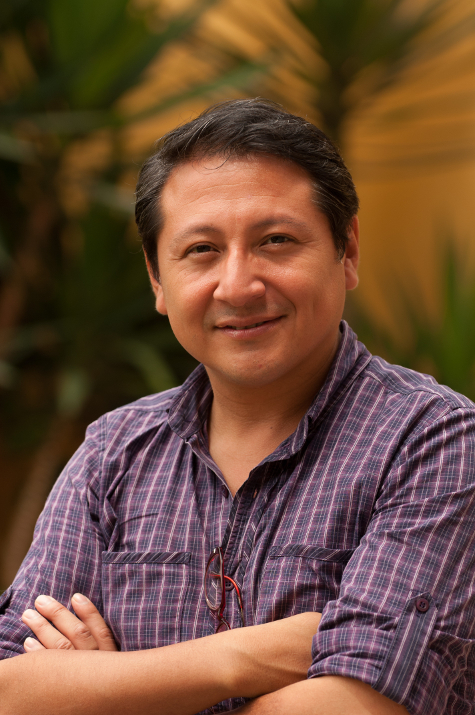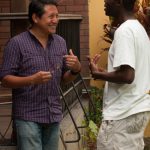Roots, The Peru Edition
Story

Javier Ortiz is fighting the ‘brain drain’ in Peru
Diaspora volunteer Javier Ortiz is fighting the ‘brain drain’ in Peru. Literally. Currently based in Lima, a sprawling and overcrowded mega-city perched on the edge of the Pacific Ocean, the new media expert is implementing knowledge-sharing strategies in a nonprofit organization dedicated to youth health, empowerment and socio-economic inclusion.
“Knowledge is of no value unless it is shared,” says Ortiz, who was born and raised in Peru’s capital. “And lessons learned about what works in development need to be efficiently captured and disseminated.”
With a cup of steaming to-go emoliente tea in hand, Ortiz makes his way through the coastal city’s draping, gray shroud of fog, from the middle-class district of Barranco to La Victoria. This populous district, a tuberculosis ‘hot spot’ associated with violence and crime, is part of Lima’s inner-city poverty belt.
And it is home to Kallpa – which means ‘strength’ in Quechua, the ancient language of the Incas – one of Cuso International’s partner groups in Peru.
Since its foundation in 1990, the organizations has striven to develop and implement sustainable and community-oriented solutions to problems, such as unemployment, insecure neighborhoods and teen pregnancy, faced by at-risk children and adolescents.
Today, Youth Employment Centers (in Spanish, Centro de Jovenes y Empleo or CJEs) – a joint initiative of Cuso International, Kallpa and Carrefour jeunesse emploi de l’Outaouais from Québec – are helping thousands of disadvantaged Peruvian and Bolivian youth set livelihood goals, find a job or become self-employed.
And what began as an innovative single-school pilot in the late 1980s to promote hygiene and health in Peru’s underprivileged urban and rural regions has become a sustainable, nation-wide program led by the Andean country’s Health and Education Ministries.
“Kallpa has had a positive and long-lasting impact on local communities, and its accumulated and extensive expertise could genuinely benefit others,” says the 38-year old Ortiz, a community radio enthusiast and self-proclaimed computer geek.
“My role is to strengthen the organization’s capacity to create, organize, transfer and share its unique insights and experiences. In my mind, that’s the essence of empowerment: sharing knowledge and understanding.”
Connecting heads
Disseminating successful development models and tools enables organizations or groups struggling with similar challenges to find inspiration. And to avoid making the same mistakes.
“As we all know, to err is human. But from lessons learned comes better development and good practice,” says Ortiz, who is also Kallpa’s webmaster and audiovisual specialist. “Knowledge-sharing is about learning collectively, building trust and horizontal partnerships, replicating what works and saving valuable time and resources.”
In spite of the demonstrated benefits of knowledge sharing, “connecting people’s heads,” according to Ortiz, can be difficult.
“Knowledge largely resides in people’s heads,” says Ortiz. “Unfortunately, they sometimes don’t realize how useful what they know can be to others, or that they have worthwhile experiences to share. And, too often, when a staff member leaves, they take their expertise with them.”
“That’s why, in addition to establishing a reliable and functional institutional memory, I aim to foment effective internal collaboration and communication, and to make knowledge-sharing and peer-to-peer mentoring the norm. After all, people are Kallpa’s most valuable resource,” he adds.
Back to his roots
Some three million Peruvians – or nearly ten percent of those born in this nation located on South America’s west coast – live abroad. Economic and social crisis are at the root of immigration, as well as the two-decade-long internal conflict in which nearly 70,000 people, most of them civilians, died or disappeared.
“At first, I wasn’t sure about coming back to Peru. But after being offered the same placement twice, I felt that the universe – or karma – was reaching out to me,” says Ortiz, a former Lima Conservatory flute student. “I don’t regret my decision at all. I feel useful, and that I am giving back to my country in a unique way.”

“Cuso International provides tailored, comprehensive pre-departure training to prepare us for the challenges and complexities of our future roles and all the necessary on-the-ground support,” he adds. “And in Peru, the staff and my fellow volunteers feel like family.”
According to Ortiz, in spite of Peru’s recent economic growth, macroeconomic indicators hide unsustainable disparity. Approximately nine million Peruvians are poor, and poverty is deepest among members of the indigenous Quechua and Aymara people living in the rural highlands – especially women and girls.
“There is still a lot of work to be done here, and I want to be a part of it”, says Ortiz, who has (re)discovered the true meaning of the expression scientia potentia est, or ‘knowledge is power’. “Lack of knowledge keeps people in poverty, while sharing knowledge empowers and makes change possible.”